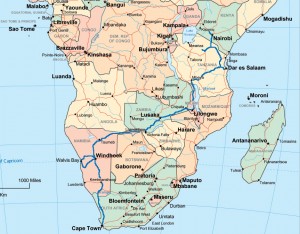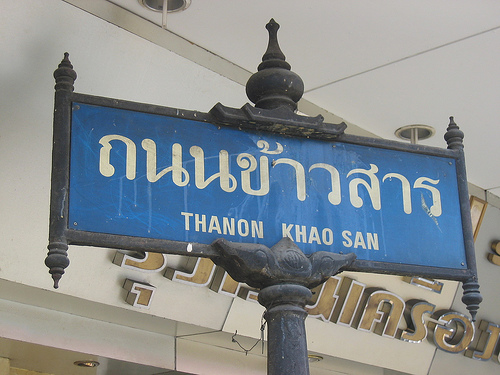When travelling, it seems no matter where you are, you still operate in a kind of bubble. You move in an almost semi-detached observer capacity to your surroundings, unable to see or experience things truly as the locals do. Insulated by your bank balance perhaps, the knowledge of alternative options or simply that you are merely ‘passing through’ and have a ticket out; there are a thousand subtle factors that differentiate you from ‘them’. Where you stay is always that little bit more accessed by other travellers, and catered, no matter how low budget, it is still tinged with western comforts. There are some exceptions to this of course – volunteering, actual homestays and hiking off-track all take you that much closer. Not that even a ‘totally realistic’ local experiences is even necessary either – its’ just difficult to achieve!
The one area I have found that this comes closest to the ‘real’ though is the simple act of sharing local transport, getting from A to B. We have found this most effectively in catching buses in Africa but it is equally true of trains in India & buses in Nepal. Here you are all thrown together – locals and travellers alike, there is no differentiation in class, the discomforts, delays, bumps, food and other circumstances are all shared equally by everybody. And for these moments the experience achieves a rare utopian equality, cherished by us perhaps, but in the most part quickly lost in the mundane by the locals – but such is life.
In the last few months, this contrast has been particularly evident as we traded the insulated backpacker environment of ‘BazBus’ in South Africa for ‘slow overland travel’ – distance coaches, local & mini-buses of all variety, trains and shared taxi’s. Winding our way from Capetown, at the southern most point of Africa, west to Namibia, and then swinging back across the continent north eastwards through Zambia, Malawi and Tanzania to Kenya. We have experienced all modes of transport combinations in between through simple necessity and in doing so watched cold coast become desert, desert unfold to savannah, dry forest give way to lakeside fisheries; and the more tropical rice fields, tea, coffee & banana plantations; lush mountain scapes transform back into savannah plains and then finally become tropical beaches.
Just like the landscape, along the way we have also watched Africa transform. As the villages roll by and new tribes reveal themselves – the people, culture and experience has itself evolved in interesting ways. On boarding the coach in Capetown, a pre-recorded version of the “Lords Prayer” was played over the intercom as a prelude to a safe trip. Departing Namibia, the manager of the bus got on and led a very heartfelt, personal prayer effort. Leaving Livingstone, Zambia a evangelical preacher got on and spent 50 minutes praizing Jeeezus, praying for our sinz and trying to “saaive our mortal soulzz” at a frantic pace. Then on a bus leaving Lilongwe, Milawi, a young preacher got on & started exorting ‘Halleluyahs’, ‘praise brothers’ and ‘Amens’ from the packed, responsive local bus, a woman behind me started chanting frenetically, hyperventilating and ‘speaking in tongues’, then broke down into tears that took about 20 minutes to dissipate, other people took it in turns to respond and share prayers while the buses speakers blared soulful, rhythmic spirituals – we had to double check whether we were actually on a public bus or perhaps mistakenly boarded a church tour. Later in Tanzania, we were even treated to an ‘in coach’ video of the “Life of Jesus” in Swahili. Either the transport got more and more dangerous as we progressed or things were definitely more religious in central / Eastern Africa. Our journey though was also paralleling a deeper exploration into more AIDS / HIV devastated country. Something like 30% of the population in Zambia is HIV positive, the average age there is late 30’s (stats similar for Malawi). One person, Polly we met in Lusaka had been researching Zambian modern artists – she had a list of 10 people to interview in the capital, but had only found 3 still alive. All had died from HIV related illness in the last few years. Most were sub 40 years old!
Quite often we were the only foreigners on the bus, sometimes there was just a single other traveller. We have been crammed into minibuses, designed to seat 12 with more than 20 other people. Every space, even the vertical, has a value in Africa it seems. I have been seated next to old ladies of all tribes and had large sacks of eggs, bananas, maize and chickens for travel companions on numerous occasions. (We found out subsequently that it is customary to bring a chicken along when you visit relatives in some parts of Africa). Babies have endured a full days cycle of smiles, fits, feeding and defecation all squashed up against my leg, sometimes roaming free but more often strapped snugly into position on mum, by a brightly patterned tablecloth in the African fashion. We have encountered several chickens thus intimately enshrined as well. It is often said of African women that they don’t just travel, they move and the aisles, racks and roofs of most bus are overflowing with large sacks of produce, food and suitcases that stand testament to this – jumping off the bus in a remote village for a quick toilet break, is frequently more akin to a game of tetris.
We have literally spent multiple days on buses – buying our food through the window at passing villages or stops as we go. Impoverished locals displaying their wares gallantly on baskets on their heads or trays as a bus pauses – quickly shouting their offerings through the windows to try and close a deal – fresh banana’s, apples, carrots, biscuits, bread rolls, coke or water, airtime, furniture, crafts or electronics. You rarely need to go looking for anything in Africa it seems, just catch a bus and it comes to you. Thus supplied, we have been constantly delayed – accidents, flat tires, police fines, derailments and everything else it seems bar a hijack (fingers crossed). Since we left South Africa, we have yet to be ontime anywhere and we have soaked it all up and loved it. As a result, we have spent intimidating nights at minibus stops in the middle of large cities, crossed dodgy border posts at the most ungodly hours and even been derailed in a national park in Tanzania, a 7 hour stop that became a travel highlight.
We have been learning ‘not to sweat the small stuff’, cultivating patience and a sense of relaxed resignation at our progress – ‘inshallah’ / ‘ce la vie’ / ‘shoganii’ / ‘whatever will be, will be’ – the joy of travel without time limits. And in all that, as ever we have met some amazing local people of all tribes and descriptions – friendly, smiling, accommodating and equanimous in the cramped, shared conditions. We have criss-crossed the African continent, spontaneously feeling our way as we go and in so doing have been gifted some amazing insights and experiences of the real Africa; we emerge perhaps better illuminated as to travel’s grand purpose along the way.
![Overlanding Africa When travelling, it seems no matter where you are, you still operate in a kind of bubble. You move in an almost semi-detached observer capacity […]](http://meltingplots.com/wp-content/uploads/2010/05/BusTop.jpg)

